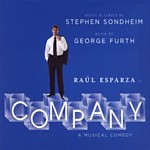As with his 2005 Broadway revival of Stephen Sondheim’s Sweeney Todd, director John Doyle downsized the composer’s landmark 1970 musical Company to chamber dimensions. In place of Jonathan Tunick’s pit band score we have small ensemble orchestrations by Mary-Mitchell Campbell featuring the actors themselves playing the instruments onstage.
The sound world is cooler, less aggressive in the big numbers, as if the driving rhythm section and affectionately retro electronic organ we remember from the original never existed. The recorded production’s extremely dry, close-up ambience suggests less of an in-house theatrical experience than an intimate radio play, where unforgiving microphones dissect each vocal ensemble attack and release, subtle harmonic twist, clever lyric, and verbal emphasis. Such scrutiny poses no problems for the cast, who collectively deliver the best-sung of the show’s three Broadway cast recordings.
The opening number’s intricate, thick vocal counterpoint couldn’t be clearer or cleaner, while in the hysterical patter song “Getting Married Today” Heather Laws raises the bar for both speed and comprehension. In “The Little Things You Do Together” all of the transitions and out-of-tempo percussion effects are calibrated to spooky perfection. Raül Esparza’s highly praised portrayal of the protagonist Bobby arguably reaches its zenith in “Being Alive”. What sustaining power and breath control!
As Joanne, Barbara Walsh retains enough of the brash cynicism Elaine Strich made famous, but in a more contained, less intonationally challenged manifestation in “The Ladies Who Lunch”. However, in the vocal trio “You Can Drive A Person Crazy”, I really miss the vocal “doo-doots” now taken up by saxophones at the ends of lines. In addition to the gripping duet “Marry Me A Little”, cut from the original show, a generous helping of dialogue bridges the individual numbers.
You won’t get anything close to the 1970 recording’s “under the gun” intensity or excitement, yet the 2006 revival’s “under the microscope” aesthetic is equally valid, often compelling, and strongly attuned to the work’s impeccable pacing and tight-knit compositional unity. Nonesuch’s 71-page book includes a full synopsis and complete libretto. [3/9/2007]
































